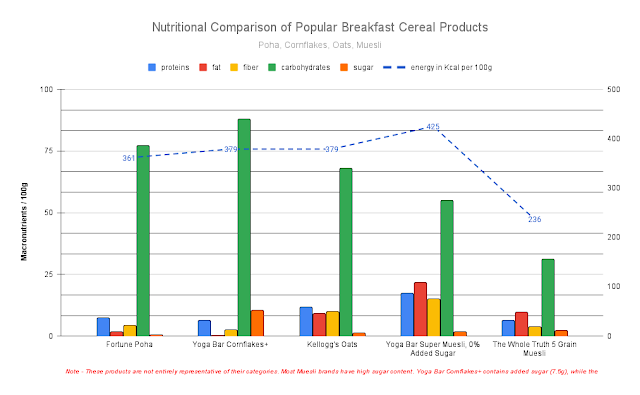Indian Nutrient Databank (INDB): A Comprehensive Open-Access Resource for Indian Food Composition
If you're keen on taking charge of your nutrition and feel limited by services like HealthifyMe or RecipeDB, you'll be happy to know about the Indian Nutrient Databank (INDB)!
This well-researched, Open Access Food Database (^Github) offers comprehensive insights into the nutritional aspects of both raw foods and commonly consumed Indian recipes, helping you manage your health better.
The INDB consists of two main components: a database of nutrient composition for 1,095 individual food items and a database of 1,014 commonly consumed recipes.
Nutrient details of the food items & recipes are also available together as a downloadable Excel file from the website of Anuvaad Solutions or from GitHub.
Whether you're a health enthusiast, a researcher, or a policymaker, the INDB offers unprecedented insight into the Indian diet.
 |
| Chart from the research study shows that the nutrient content of commonly consumed composite dishes varied considerably |
The raw food items database was primarily derived from the Indian Council of Medical Research-National Institute of Nutrition's Indian Food Composition Table (ICMR-NIN IFCT) 2017, with gaps filled using the 2004 version and nutrient databases from the UK and US.
The recipes database includes information on ingredients, serving sizes, and nutrient values, with matching to comparable food items in the raw food database.
The INDB includes nutritional values for various nutrients, such as energy, carbohydrates, protein, fat, free sugars, fiber, and vitamins.
Cooking can result in nutrient loss, with the highest losses observed for vitamin C, potassium, and phosphorus.
The INDB's nutrient values differ from the UK FCT, possibly due to differences in recipes, laboratory methodology, or true underlying differences in nutrient composition.
Limitations include the lack of nutrient data on packaged food items and the need for updates to account for yield factors and regional dishes.
The authors of this study are Aswathy Vijayakumar, Hima Bindu Dubasi, Ananya Awasthi, and Lindsay M Jaacks. The research was funded by The Bill and Melinda Gates Foundation.


Comments
Post a Comment